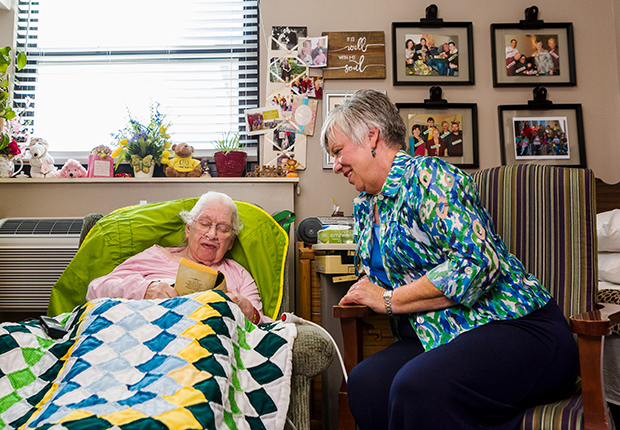AARP Hearing Center

By John Reinhart
As longtime family caregivers, Virginia Hopp and Rebecca McClanahan understand the importance of providing support to the thousands of Missourians caring for aging family members.
Hopp, 72, of Carthage, and McClanahan, 65, of Kirksville, are both ardent advocates for passage of the CARE Act, which has died without a hearing in the Missouri General Assembly each of the past two years.
Key provisions of the CARE Act (formally known as the Caregiver Advise, Record, Enable Act) would require hospitals to record the name of a family caregiver, inform the designee when the patient is to be discharged and provide the caregiver with instructions on medical tasks to be performed for the patient.
The measure has been enacted in 36 states, the District of Columbia, Puerto Rico and the U.S. Virgin Islands.
“I think the legislature is slow to act because they do not understand the responsibility of the family caregiver for their loved one,” Hopp said. “If they did, I think they would help support them.”
Caregiver support ranks low
Missouri ranks 47th nationally in caregiver support, according to the 2017 Long-Term Services & Supports State Scorecard compiled by the AARP Public Policy Institute, the Commonwealth Fund and the SCAN Foundation.
The report, the third since 2011, found that Missouri ranks in or near the bottom quarter of states in supporting family caregivers who work, providing person- and family-centered care and making it easier for people in nursing homes to return to their own or a relative’s home.
AARP Missouri has lined up a variety of activities this fall to push for the act, said Jay Hardenbrook, AARP Missouri director of advocacy. Among them will be aggressive use of social media and a series of presentations by AARP volunteer speakers to civic groups and senior centers.
AARP Missouri also plans to tap the knowledge and expertise of its Action Council in raising the visibility of the CARE Act. Composed of Missourians of diverse backgrounds, from former legislators to retired schoolteachers, the 20-person council provides AARP with guidance on state and national issues.
Hopp and McClanahan are both council members.
Hopp became her mother’s full-time caregiver five years ago. A year later, she began volunteering for AARP. She leads a support group for family caregivers in Southwest Missouri. Her mother died this summer, and she is immersed in settling the estate.
McClanahan, a registered nurse, served two terms in the General Assembly and is vice president of advocacy at the Missouri Nurses Association.
She is a family caregiver who tends to her mother, who resides in a nursing home, and her husband, who lives at home. McClanahan’s husband has Parkinson’s disease and recently developed Parkinson’s-related dementia.
As a nurse, she said, she’s acquired substantial coping skills through the years, but the responsibility of providing care for two family members has been difficult.
The tasks of a family caregiver, McClanahan said, are “incredibly overwhelming.”
“Family caregivers do this out of love,” she said. “People don’t realize the burden they are carrying.”
John Reinhart is a former strategies communications director for AARP.































































